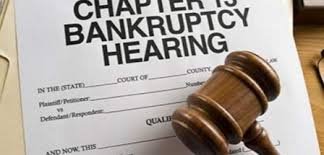Guide on Chapter 13 Bankruptcy Declaration
 Chapter 13 bankruptcy is filed when an individual is having problem paying for their debts. By filing a chapter 13 bankruptcy, you will be able to get discharged from some of the debts. Chapter 13 bankruptcy is different than chapter 7 bankruptcy as you are allowed to keep your properties while repaying the debt in a repayment plan that has been approved by the court. There are a number of requirements that you must in order to be qualified to file for the chapter 13 bankruptcy.
Chapter 13 bankruptcy is filed when an individual is having problem paying for their debts. By filing a chapter 13 bankruptcy, you will be able to get discharged from some of the debts. Chapter 13 bankruptcy is different than chapter 7 bankruptcy as you are allowed to keep your properties while repaying the debt in a repayment plan that has been approved by the court. There are a number of requirements that you must in order to be qualified to file for the chapter 13 bankruptcy.
Chapter 13 bankruptcy can be filed by individuals as well as married couples but businesses cannot file for this type of bankruptcy. You must meet the credit counseling requirement by getting debt counseling with a credit counseling agency approved by the court 180 days before filing for the Chapter 13 bankruptcy. You are to file for a certificate of proof with the court within a period of 15 days following the filing of the Chapter 13 bankruptcy to show that you have attended the debt counseling. If a debt management plan is created, you should hand in a copy to the court.
There is a limit on how much debt the filer can have when filing for the Chapter 13 bankruptcy. The limit of the debt is adjusted every 3 years due to inflation. You have to provide proof that you have been filing for the tax returns for the past 4 years during the first meeting with the creditors. According to the law of Chapter 13 bankruptcy, there are certain debts that you have to repay including priority debts, and secured debts. For non priority and unsecured debts, you are to repay back at least the amount that is equivalent to the nonexempt property’s value. You must prove that you have enough income to repay back the debt. The income can include that of your spouse even if you did not file for a joint bankruptcy.
Every jurisdiction has its own procedures regarding bankruptcy cases. The chapter 13 bankruptcy form is also unique in each jurisdiction. When you fill out the form, make sure you follow the instructions. There are different sections for different types of debts on the form. There are very few individuals who succeed in the filing of their bankruptcy case on their own because chapter 13 bankruptcy is a complicated case. Therefore, it is advised that seek the help of an attorney that is knowledgeable in handling chapter 13 bankruptcy case.
Usually, the bankruptcy lawyer will ask for an upfront fee and he will only file for your case after the fees are paid in full. Part of the fees will be settled upfront and the remaining fees will be settled in a repayment plan. The repayment plan usually spans for a period of in between 3 – 5 years and the amount of your monthly payment will depend on how much debt you owed. This is why you should always confirm with the bankruptcy law about how much fees you need to pay upfront.
More to Read:
Previous Posts:










